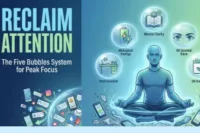Top Online Learning Skills to Master in 2025 for Career Success
Published: 25/04/2025
It’s frustrating to realize that the skills you’ve worked so hard to master might soon become outdated. As industries evolve and new technologies emerge, staying ahead is more important than ever. Online learning skills offer a solution, allowing you to continue growing and adapting at your own pace. In fact, a recent study shows that by 2025, nearly 50% of all workers will need new skills to stay competitive in the workforce. This is the reality many professionals are facing as technology reshapes the job market.
The good news is that online learning has become a game-changer. It’s no longer just an optional tool—it’s now a vital way to future-proof your career and adapt to the demands of an ever-changing workforce. But with so many options out there, where do you even begin?
In this post, we’ll guide you through the top online learning skills to master in 2025. You’ll discover how to build a personalized learning plan, balance immediate needs with long-term growth, and access valuable resources to support your journey.
Ready to turn uncertainty into opportunity? Keep reading to find out how mastering online learning skills can unlock new career prospects, boost your earning potential, and position you for success in a rapidly evolving job market.
The Evolution of Online Learning in 2025
Online learning has come a long way since 2020, with significant changes that have shaped how we approach education today. As technology advanced, so did the tools available to both students and educators. The learning experience has become more interactive, personalized, and accessible, opening doors for people everywhere to gain new skills and knowledge.
- Increased accessibility: Learning can now happen anytime, anywhere, thanks to mobile-friendly platforms and apps.
- Personalized learning paths: Adaptive learning technology tailors lessons to each student’s pace and style.
- Interactive content: Online courses now include videos, quizzes, live sessions, and discussion boards to keep students engaged.
- Collaborative learning: Platforms enable group work, peer feedback, and real-time communication, mimicking classroom environments.
Current Trends Shaping the Online Learning Landscape in 2025
As we move into 2025, online learning continues to evolve. The trends we see today are shaping the future of education, making it more flexible, diverse, and interactive than ever before.
- Microlearning: Bite-sized learning modules are gaining popularity, allowing learners to pick up skills in short, manageable chunks.
- Immersive learning: Virtual reality (VR) and augmented reality (AR) are becoming part of the curriculum, providing real-world simulations.
- AI integration: Artificial intelligence is helping personalize learning experiences, offering real-time feedback and content recommendations.
- Credentials that matter: Non-degree programs, certifications, and badges are becoming increasingly valuable to employers.
Why Traditional Education Alone is No Longer Sufficient
In today’s fast-paced world, traditional education methods are not enough to keep up with the rapid changes in the job market. As industries evolve, so do the skills required to succeed. Online learning offers a more flexible, focused, and affordable alternative that allows learners to upskill at their own pace.
- Faster skill development: Online courses allow students to learn specific skills quickly, without waiting for semesters to pass.
- Cost-effectiveness: Compared to traditional universities, online courses often cost a fraction of the price.
- Adaptability: Learners can update their skills in response to industry trends, instead of waiting for academic curriculums to catch up.
The Democratization of Education Through Online Platforms
Online education has leveled the playing field, giving everyone, regardless of location or background, the chance to access high-quality learning resources. This shift is helping to break down barriers to education that once seemed insurmountable.
- Global access: Students from anywhere in the world can attend top courses and programs.
- Affordable options: Free or low-cost online courses are available, making learning accessible to a wider audience.
- Flexible scheduling: People with busy lives, such as working professionals and parents, can learn at their own convenience.
Statistics on Employers’ Changing Attitudes Toward Online Credentials
Employers are increasingly recognizing the value of online learning and digital credentials. The shift toward online education has led to a change in how companies view qualifications, making them more open to alternative learning paths.
- Growing acceptance: 78% of employers now accept online certifications as credible qualifications.
- Skills over degrees: Employers are placing more importance on skills and competencies, rather than traditional degrees.
- Increased hiring for online learners: 62% of companies report hiring candidates with online certifications or microcredentials over traditional degree holders.
This shift is a clear sign that online learning is not just an alternative to traditional education but an important part of career advancement.
The Online Learning Skills Framework for 2025
The skill requirements for 2025 are diverse, with a blend of technical expertise and soft skills that are crucial for career success. Below, we’ll take a look at key skill clusters you should focus on to stay ahead in the rapidly changing job market.
Technical Skills Cluster
These foundational skills will be essential for almost every career path in 2025.
Data Literacy and Analytics
- Why it’s important: Data is the backbone of decision-making in most industries today, making data literacy a must-have skill.
- Key tools: Python, R, SQL for data analysis and visualization.
- Progression: Start with basic data literacy, then advance to learning complex analytics and tools.
- Real-world application: Data skills are valuable in roles like data scientist, analyst, and even marketing or HR professionals who need to interpret data.
- Career trajectory: Data roles have high salary potential, with opportunities in industries ranging from tech to healthcare.
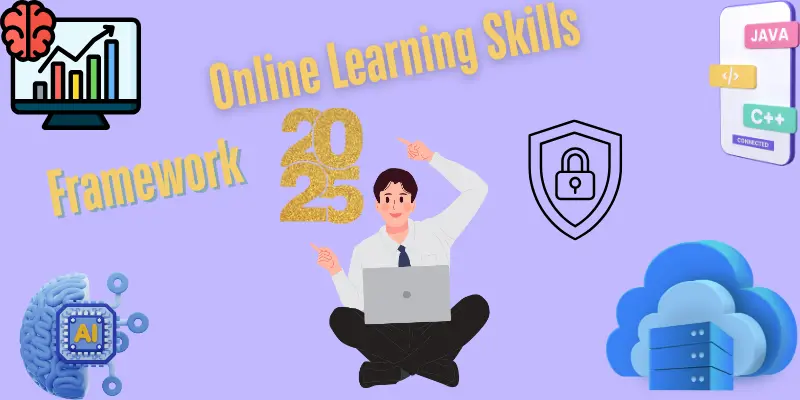
Artificial Intelligence and Machine Learning
- Fundamentals vs. specialized expertise: AI basics, like machine learning algorithms, can be grasped by non-tech professionals, while deeper specialization (e.g., neural networks) requires advanced expertise.
- Practical skills: Learn to use AI tools, collaborate with AI systems, and understand ethical AI practices.
- Ethical considerations: Focus on responsible AI usage, addressing bias, and data privacy.
- AI in the workforce: AI enhances rather than replaces human roles, offering collaboration opportunities across various fields.
Software Development and Programming
- Essential languages for 2025: JavaScript, Python, and Go are key programming languages for software developers.
- Low-code/no-code development: Empower non-developers to create apps without extensive coding knowledge.
- Emerging trends: DevOps, agile methodologies, and mobile app development are increasingly in demand.
- Integration and microservices: Understanding API integration and microservices architecture is essential for modern software development.
Cybersecurity Fundamentals
- Why cybersecurity matters: As digital transformation increases, cybersecurity is critical to protect data and systems.
- Basic practices: Everyone should understand basic security protocols, such as password management and data encryption.
- Industry-specific considerations: Certain sectors, like finance or healthcare, require specialized knowledge of compliance and regulations.
- Security-first mindset: Building a security-conscious approach is essential for protecting organizations from threats.
Cloud Computing and Infrastructure
- Cloud service models: Understanding the different cloud models (SaaS, PaaS, IaaS) is key for businesses leveraging cloud technology.
- Multi-cloud strategies: Know how to use multiple cloud providers to optimize performance and reduce risk.
- Cost and sustainability: Learning how to optimize cloud costs and consider the environmental impact of cloud infrastructure will be crucial.
Business and Soft Skills Cluster
While technical skills are essential, soft skills will help you collaborate, communicate, and thrive in digital work environments.
Digital Communication and Collaboration
- Remote work collaboration: Master advanced remote work tools and techniques to maintain team productivity.
- Digital storytelling: Learn how to present data and ideas effectively using digital platforms.
- Cross-cultural communication: As teams become more global, understanding cultural differences will enhance communication.
- Virtual team building: Develop strategies for fostering strong, supportive relationships in digital teams.
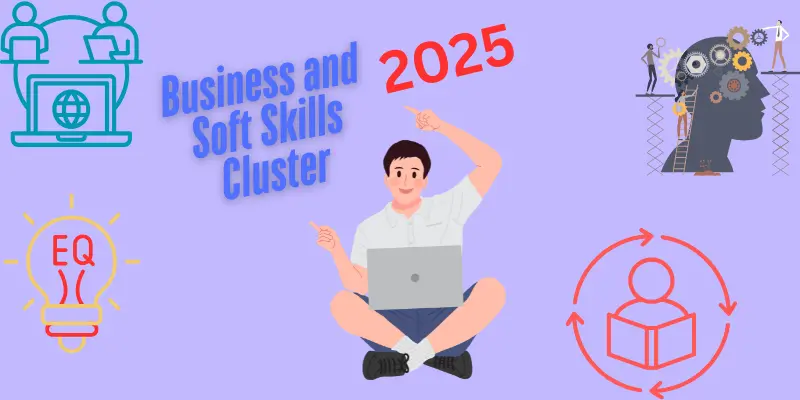
Emotional Intelligence in Digital Environments
- Recognizing emotional cues: In virtual settings, being able to read emotional signals from text or video is key.
- Building rapport online: Learn how to build trust and empathy without face-to-face interaction.
- Conflict resolution: Navigate disagreements in a digital space, focusing on understanding and resolution.
Strategic Thinking and Problem-Solving
- Systems thinking: Ability to view problems from multiple angles and consider their broader impact.
- Creative problem-solving: Develop frameworks for tackling complex challenges.
- Scenario planning: Anticipate future trends and plan for uncertainty.
- Ethical decision-making: Integrate ethics into decision-making processes, especially in complex business environments.
Adaptability and Continuous Learning
- Meta-learning: Understand how to learn efficiently, optimizing how you acquire new knowledge and skills.
- Building learning habits: Establish routines that make learning a consistent part of your professional life.
- Knowledge management: Stay organized and capture the most important insights from your learning journey.
- Dealing with learning plateaus: Learn strategies to break through challenges and continue growing.
Specialized Skills Cluster
These specialized skills will allow you to stand out and open doors to unique career opportunities.
Digital Marketing and Content Creation
- Data-driven strategies: Learn how to use analytics to drive marketing decisions.
- SEO and growth: Understand SEO techniques to increase your content’s visibility.
- Marketing automation: Learn to use tools for automating marketing efforts and personalizing content.
- Content creation: Explore different content formats and how to engage your audience effectively.
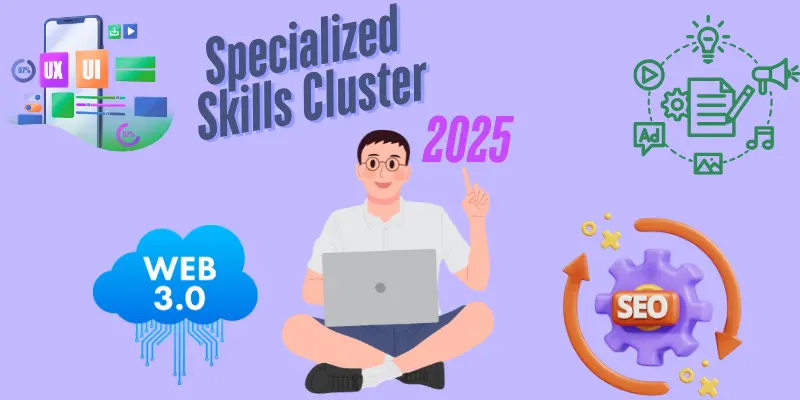
UX/UI Design Thinking
- User-centered design: Focus on designing products that meet the real needs of users.
- Inclusive design: Ensure your designs are accessible to everyone, including those with disabilities.
- Prototyping and testing: Master rapid prototyping and conducting user testing to refine your designs.
- Behavioral psychology: Apply psychological principles to create intuitive user experiences.
Blockchain and Web3 Technologies
- Blockchain basics: Learn about decentralized systems and how they’re transforming industries.
- Smart contracts and decentralized finance (DeFi): Understand how these technologies are disrupting financial services.
- NFTs and digital assets: Explore how NFTs are changing the world of digital ownership.
- Web3 business models: Familiarize yourself with the opportunities Web3 presents for businesses.
The Skill Stacking Advantage
Mastering a combination of complementary skills, rather than focusing on a single skill, can set you apart in the job market. Skill stacking allows you to create a unique profile that opens up more opportunities and accelerates your career growth. Here’s why it works and how to make it happen for you.
Why Mastering Complementary Skills Creates Exponential Value
When you combine skills that complement each other, the value you bring to the table increases dramatically.
- Holistic expertise: You can solve problems from multiple angles, making you more versatile in the workplace.
- Increased adaptability: A combination of skills enables you to pivot between roles or industries with ease.
- Higher demand: Employers often look for candidates with a diverse skill set that covers a broader range of tasks and challenges.
Strategic Skill Combinations for Different Career Paths
Different career paths require different skill stacks. Here’s how to build one tailored to your field:
- Data scientist: Combine programming (Python, R), statistics, and business acumen for effective data-driven decision-making.
- Digital marketer: Pair expertise in SEO, content creation, social media, and analytics to maximize marketing efforts.
- Product manager: Combine technical knowledge, project management, and user experience (UX) design to drive product development.
Case Studies of Successful Skill Stackers
Real-world examples show the power of skill stacking in action.
- Example 1: A freelance web designer combined design skills with coding knowledge (HTML, CSS, JavaScript), allowing them to offer full-service websites and command higher fees.
- Example 2: A professional in healthcare enhanced their expertise by adding data analysis skills, enabling them to transition into healthcare analytics and consulting roles.
How to Identify Your Optimal Skill Stack
Building the right skill stack starts with understanding your goals and interests.
- Assess your current skills: Identify where you already excel and what skills complement those strengths.
- Research industry needs: Look at job descriptions in your field to identify which skills are in high demand.
- Test and iterate: Experiment with different skill combinations and refine your stack as you learn more about the market and your career aspirations.
Avoiding the “Jack of All Trades, Master of None” Pitfall
While it’s important to have a diverse skill set, there’s a fine line between being versatile and spreading yourself too thin.
- Focus on mastery: Even with a diverse skill stack, ensure you have deep expertise in at least one area.
- Specialize strategically: Choose a niche where your combination of skills will give you a competitive edge, rather than trying to master everything.
- Avoid superficial knowledge: Ensure that the skills in your stack are well-rounded and deeply understood, not just surface-level knowledge.
By strategically combining complementary skills, you can create a unique professional profile that stands out in any field and offers exponential value.
Personalized Learning Roadmaps
Building a personalized learning roadmap is essential for staying focused and achieving career success. By assessing your current skills, setting clear goals, and managing your time efficiently, you can ensure steady progress in your learning journey. Here’s how to create a roadmap that works for you.
Self-Assessment Tools to Identify Skill Gaps
Before diving into your learning journey, it’s crucial to assess where you currently stand.
- Identify strengths and weaknesses: Use self-assessment tools like SWOT analysis (Strengths, Weaknesses, Opportunities, Threats) to evaluate your skills.
- Skill gap analysis: Compare your current skill set with industry requirements to spot areas where you need improvement.
- Online quizzes and tests: Take free assessments on platforms like LinkedIn Learning or Coursera to benchmark your abilities.
Creating a Personalized Learning Plan Based on Career Goals
A clear learning plan aligned with your career aspirations is key to focused learning.
- Set SMART goals: Make your goals Specific, Measurable, Achievable, Relevant, and Time-bound.
- Break goals into manageable steps: Divide larger goals into smaller, actionable tasks to make steady progress.
- Prioritize learning topics: Focus on the skills that will have the biggest impact on your career advancement first.
Balancing Immediate Needs with Long-Term Skill Development
It’s important to strike a balance between skills you need now and those that will benefit you down the line.
- Tackle urgent skills: Identify and learn the skills required for your current job or upcoming opportunities.
- Plan for future growth: Consider how you can develop skills that align with long-term career goals, even if they’re not immediately needed.
- Continuous review: Regularly assess whether your learning plan needs adjusting based on changing priorities or new career insights.
Time Management Strategies for Consistent Learning
Effective time management will help you stay consistent and prevent burnout.
- Time blocking: Dedicate specific blocks of time each day or week for focused learning.
- Set learning goals: Break study sessions into focused intervals (e.g., 25-30 minutes) with short breaks in between (Pomodoro technique).
- Avoid multitasking: Commit to one learning task at a time to maximize focus and retention.
Progress Tracking and Adjustment Methodologies
Regularly tracking progress will keep you on track and help you stay motivated.
- Track milestones: Use a journal or app to monitor what you’ve learned and how far you’ve come.
- Adjust your plan: Be flexible and ready to tweak your learning roadmap based on progress or new opportunities.
- Celebrate small wins: Recognize your progress, even if it’s small, to maintain motivation and keep learning enjoyable.
By following these steps, you can create a personalized learning roadmap that aligns with both your immediate needs and long-term career goals. This structured approach ensures that you stay motivated, efficient, and continuously on the path to success.
From Learning to Earning: Implementation Strategies
As you progress from learning to applying new skills, the key to success is practical experience. One of the best ways to demonstrate your abilities and increase your chances of career advancement is by creating a portfolio that highlights your work.
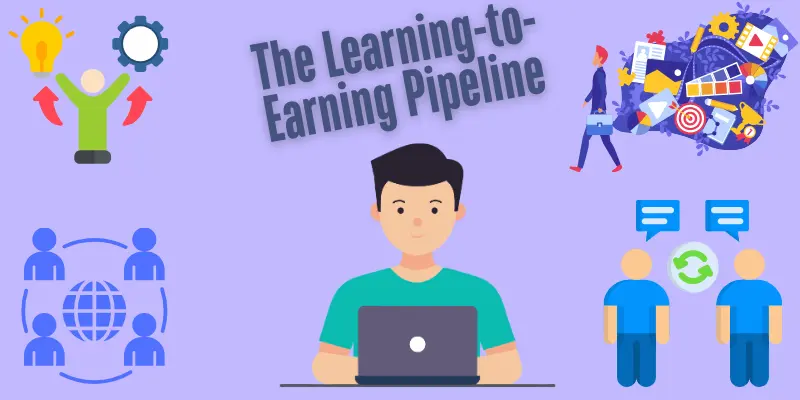
Building a Portfolio that Showcases Your Skills
A strong portfolio is key to demonstrating your abilities and attracting opportunities. Here’s how you can build one:
- Choose your best work: Focus on showcasing projects that highlight your expertise.
- Include diverse examples: Show a variety of skills to demonstrate your versatility.
- Keep it updated: Regularly add new projects and accomplishments to keep it fresh.
- Make it easy to navigate: Ensure your portfolio is user-friendly and visually appealing.
Creating Micro-Projects for Practical Application
Micro-projects help you apply what you’ve learned in real-world scenarios. Consider these tips:
- Start small: Choose manageable projects that align with your skill set.
- Focus on quality: Even small projects should reflect your best work.
- Build in public: Share your progress online to get feedback and build credibility.
- Highlight challenges faced: Show how you overcame obstacles to demonstrate problem-solving skills.
Leveraging Online Communities for Feedback and Networking
Online communities offer a wealth of knowledge and networking opportunities. Here’s how to make the most of them:
- Join relevant groups: Engage in forums, discussion boards, or social media groups related to your field.
- Seek constructive feedback: Use community feedback to improve your skills and work.
- Build relationships: Connect with other learners, professionals, and experts in your industry.
- Share your knowledge: Offering advice or resources can help build your reputation.
Finding Mentors and Accountability Partners
Mentorship and accountability are crucial for your growth. Here’s how to find them:
- Look within your network: Seek out experienced professionals who can offer guidance.
- Use mentorship platforms: Platforms like LinkedIn or specialized mentorship services can help connect you with potential mentors.
- Set clear goals: Establish what you want from the mentorship and communicate your goals clearly.
- Pair up with an accountability partner: Find someone with similar learning goals to check in with regularly and keep each other on track.
Transitioning from Learning to Professional Application
Applying what you’ve learned to real-world situations is key to moving forward in your career. Here’s how to bridge the gap:
- Take on freelance work or internships: Gain practical experience in your field while continuing to learn.
- Start small in your job: Look for opportunities to apply new skills in your current role.
- Reflect on your growth: Regularly assess how your learning is impacting your career and adjust your approach if needed.
- Build a professional brand: Use your portfolio and experiences to market yourself as a skilled professional.
Learning Platform Comparison and Resource Guide
Choosing the right learning platform can make a huge difference in how effectively you master new skills. With so many options available, it’s important to evaluate each one based on your learning goals and budget. Here’s a guide to help you navigate the options.
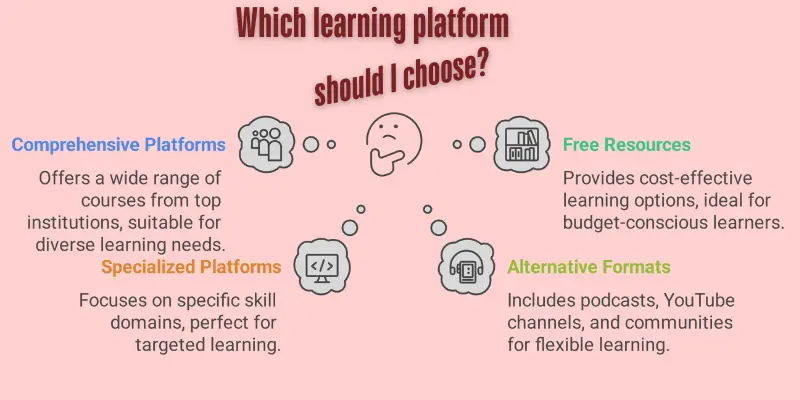
Comprehensive Comparison of Major Learning Platforms
Different platforms cater to different learning needs, so it’s crucial to find one that aligns with your career goals.
- Coursera: Offers courses from top universities and companies, providing both free and paid options.
- Udemy: A large library of affordable courses, often taught by industry professionals.
- LinkedIn Learning: Perfect for professionals seeking to upgrade their skills with industry-relevant courses.
- edX: Known for academic and professional development courses, some free, but certificates are paid.
Free vs. Paid Resources for Each Skill Area
While many platforms offer free content, paid resources tend to provide more in-depth and structured learning paths.
- Free: Platforms like YouTube, Khan Academy, and podcasts can provide a wealth of free content.
- Paid: Platforms like Coursera, Udemy, and LinkedIn Learning offer more specialized courses with expert-led instruction and certificates.
Specialized Platforms for Specific Skill Domains
Certain platforms are tailored to specific skills, providing targeted learning experiences.
- Data Science: DataCamp and Kaggle offer focused courses in data analytics and machine learning.
- Web Development: Codecademy and freeCodeCamp specialize in coding and web development.
- Creative Fields: Skillshare and MasterClass are ideal for those wanting to improve creative skills like design, photography, and writing.
Alternative Learning Formats (Podcasts, YouTube Channels, Communities)
Sometimes, learning goes beyond structured courses.
- Podcasts: Great for on-the-go learning; look for industry-specific podcasts in your field.
- YouTube Channels: Channels like Traversy Media (for coding) or The Futur (for design) provide free, high-quality tutorials.
- Online Communities: Engage in forums like Reddit, Stack Overflow, or Discord groups where people share knowledge and resources.
Evaluating the Quality and Relevance of Learning Resources
Not all learning resources are created equal, so it’s important to assess their value.
- Reviews and ratings: Check user feedback to gauge the quality of courses.
- Instructor credentials: Ensure that the instructors have relevant experience or qualifications.
- Content updates: Look for resources that are regularly updated to reflect the latest industry trends.
Overcoming Online Learning Challenges
Online learning can be incredibly rewarding, but it comes with its own set of challenges. Whether it’s staying motivated or balancing learning with other commitments, addressing these obstacles is key to making progress. Here are some strategies to help you overcome common online learning challenges.
Strategies for Maintaining Motivation and Consistency
Staying motivated can be tough without the structure of a traditional classroom, but these strategies can help:
- Set clear goals: Break your learning into small, manageable tasks and celebrate small wins.
- Create a routine: Dedicate a specific time each day to learning, making it a habit.
- Track progress: Keep a log of what you’ve learned to visualize your improvement.
- Reward yourself: Celebrate milestones to keep yourself motivated along the way.
Dealing with Information Overload and Decision Paralysis
With so many resources available, it’s easy to feel overwhelmed. Here’s how to tackle this issue:
- Prioritize: Focus on mastering one topic at a time to avoid feeling scattered.
- Limit your choices: Narrow down the platforms and resources you use to reduce decision fatigue.
- Stick to a plan: Follow a structured course or learning path to keep you on track.
Balancing Learning with Work and Personal Responsibilities
It’s challenging to juggle learning with work and personal life, but here are a few tips:
- Time block: Schedule specific blocks of time for learning, just like you would for work.
- Use micro-learning: Break lessons into smaller chunks that you can complete in short bursts throughout the day.
- Communicate with others: Let family, friends, or coworkers know your schedule so they can support your learning goals.
Addressing Common Learning Barriers and Solutions
Everyone faces barriers while learning. Here’s how to tackle some common ones:
- Lack of focus: Try eliminating distractions by creating a dedicated study space.
- Procrastination: Start with easy tasks to build momentum.
- Confidence issues: Remember, it’s okay to make mistakes—learning is a process, and persistence pays off.
Creating a Supportive Learning Environment
Your learning environment plays a big role in how successful you are.
- Join online communities: Connect with other learners for support and motivation.
- Find an accountability partner: Share your goals with someone who can check in on your progress.
- Eliminate distractions: Create a quiet, comfortable study space that helps you focus and stay engaged.
Future-Proofing Your Skill Set Beyond 2025
As technology evolves, the skills that are in demand also change. To stay competitive in the workforce, it’s crucial to adapt and develop skills that will remain relevant in the future. Here’s how to future-proof your skill set and ensure you’re ready for what’s ahead.
Emerging Technologies and Skills on the Horizon
New technologies are transforming industries, and understanding these developments will be key to staying relevant:
- AI and automation: Understanding how AI will impact different sectors and how to work alongside automated systems.
- Blockchain: Skills related to decentralized systems, cryptocurrencies, and smart contracts.
- Quantum computing: While still in its early stages, being aware of its potential will position you ahead of the curve.
- AR/VR: Augmented and virtual reality are revolutionizing fields like healthcare, gaming, and education.
Industry-Specific Future Skill Requirements
Certain industries will require specific skills to thrive as they evolve:
- Healthcare: Digital health tools, telemedicine, and bioinformatics.
- Finance: Understanding blockchain for secure transactions and data analytics for risk management.
- Manufacturing: Skills in robotics, 3D printing, and IoT (Internet of Things).
- Marketing: Mastery of AI-driven marketing tools and data analytics for personalized customer experiences.
Building Adaptability as a Core Competency
Being able to adapt to new technologies and shifting work environments is essential:
- Stay curious: Keep up with trends and embrace change instead of resisting it.
- Embrace new tools: Regularly experiment with new software, tools, and platforms to stay comfortable with change.
- Flexibility: Work on your ability to quickly pivot your skills to meet the needs of evolving industries.
Creating a Continuous Learning Mindset
To remain relevant, learning shouldn’t stop. Develop habits that encourage ongoing education:
- Set long-term learning goals: Treat learning as a lifelong process, not just a one-time effort.
- Be proactive: Don’t wait for new skills to be required—anticipate changes and learn ahead of time.
- Self-reflect: Regularly assess your skills and identify areas for improvement.
Balancing Specialization with Versatility
While expertise in a specific field is important, having a broader range of skills can make you more adaptable:
- Specialize strategically: Deep knowledge in one area can set you apart, but make sure it aligns with future industry demands.
- Develop complementary skills: Skills in communication, project management, and collaboration enhance your technical expertise.
- Stay versatile: A broad skill set allows you to switch roles or industries if needed, keeping you resilient in changing job markets.
Success Stories and Case Studies
Real-life success stories offer inspiration and proof that online learning can lead to meaningful career transformations. Let’s take a look at how individuals from various industries have used online learning to achieve their goals.
Diverse Examples of Career Transformations Through Online Learning
Online learning has opened doors for countless individuals, helping them pivot careers and gain new skills:
- Tech transition: Many professionals have transitioned into software development by completing coding bootcamps and online courses.
- Marketing to Data Science: Individuals with marketing backgrounds have shifted to data analytics roles by learning data science tools and techniques.
- Career changers: People in non-technical fields (e.g., teaching or healthcare) have upskilled in areas like graphic design or digital marketing through online resources.
Industry-Specific Success Stories
Industries are evolving, and professionals are adapting by learning new skills relevant to their fields:
- Finance: A financial analyst used online certifications in blockchain and cryptocurrency to land a role in the rapidly growing fintech sector.
- Healthcare: Nurses and healthcare workers have embraced telemedicine and digital health platforms by taking online courses in health IT and digital health management.
- Creative industries: Artists have advanced their careers by learning digital design and animation through platforms like Skillshare and Udemy.
Non-Traditional Paths to Success
Not everyone follows a traditional educational path, and many have found success by creating their own learning journeys:
- Self-taught programmers: Many developers are self-taught through online tutorials and coding communities, building impressive portfolios that led to freelance or full-time work.
- Entrepreneurs: Aspiring entrepreneurs have gained business and marketing skills through online courses, eventually launching successful startups.
- Freelancers: Freelancers across various sectors (writing, graphic design, etc.) have honed their craft using online platforms, eventually growing a steady client base.
Lessons Learned and Pitfalls to Avoid
While online learning can be a game-changer, it’s important to avoid common mistakes along the way:
- Don’t rush: Learning takes time—rushing through courses without truly understanding the material can set you back.
- Avoid overwhelm: Jumping into too many courses at once can lead to burnout. Focus on mastering one skill at a time.
- Stay consistent: Many people start strong but lose motivation over time. Establishing a routine can help maintain progress.
Common Patterns Among Successful Skill Builders
There are key habits and strategies that successful online learners tend to share:
- Goal setting: Successful learners set clear, achievable goals and break them down into smaller steps.
- Self-discipline: They are motivated and disciplined enough to create a consistent learning schedule.
- Networking: Many learners engage with online communities, seeking feedback and advice from peers and mentors.
- Persistence: They persevere through challenges and setbacks, knowing that skill-building is a marathon, not a sprint.
These stories and patterns show that with the right approach, anyone can use online learning to achieve career success and personal growth.
ROI Analysis: Maximizing Your Learning Investment
Investing in online learning is a strategic decision, and it’s important to understand the potential return on that investment. Here’s how to analyze the ROI and make sure you’re getting the most value from your learning efforts.
Time Investment vs. Potential Earnings for Different Skills
Some skills require more time to master but can lead to higher earnings, while others offer quicker returns.
- High time investment, high reward: Data science, software development, and cybersecurity often require several months of learning but can lead to lucrative salaries.
- Lower time investment, moderate reward: Digital marketing, graphic design, and project management skills can be learned relatively quickly, with earnings that steadily grow over time.
- Quick-to-learn, entry-level: Skills like customer support or administrative assistance can be picked up in weeks but offer more modest earnings initially.
Short-Term vs. Long-Term Career Impact Analysis
Some skills offer immediate benefits, while others contribute to long-term career growth.
- Short-term impact: Certifications in specific software or tools (like SEO, Google Analytics) can help you secure a job or a promotion quickly.
- Long-term impact: Developing expertise in emerging fields (like AI or blockchain) can take time but will make you highly marketable in the future.
- Strategic learning: It’s crucial to balance short-term gains with long-term growth, ensuring that you’re building a sustainable career path.
Cost Comparison of Different Learning Approaches
Learning can be costly, but there are a range of options to fit different budgets.
- Free resources: Platforms like YouTube, Khan Academy, and Coursera’s free courses can be an affordable way to start learning.
- Paid courses: Platforms like Udemy and LinkedIn Learning charge for courses, but they often provide deeper, structured learning paths.
- Formal education: University degrees or specialized bootcamps can be expensive but may offer formal credentials that some employers prefer.
Measuring the Non-Financial Benefits of Skill Development
Skill development isn’t just about financial return—it can also have personal and professional benefits.
- Job satisfaction: Learning new skills can lead to a more fulfilling career, especially if you enjoy the work you’re doing.
- Increased confidence: Mastering a new skill boosts your self-esteem and makes you feel more capable in your role.
- Work-life balance: Some skills, like remote work management or time management, can improve your efficiency and allow for a better balance between work and personal life.
Strategies for Employer-Sponsored Learning Opportunities
Many companies offer support for employees who want to continue their education.
- Ask for training budgets: Some employers allocate a set budget for professional development—make sure to ask about this option.
- Use available resources: Take advantage of any free or discounted courses that your company might offer, including access to platforms like LinkedIn Learning.
- Propose a business case: If your employer doesn’t currently offer learning support, demonstrate how a specific skill could benefit the company’s growth and success.
By carefully analyzing the costs and potential rewards of your learning investments, you can make smarter choices that pay off both financially and personally in the long run.
Wrapping Up: Key Online Learning Skills to Master for Career Success in 2025
To sum up, mastering the essential online learning skills for 2025—such as data literacy, AI, digital communication, and emotional intelligence—will not only keep you competitive in the ever-changing job market but also unlock new career opportunities. The key to success is embracing a personalized approach to your skill development. Take time to identify the skills that align with your career goals and focus on learning them at your own pace.
Ready to start your learning journey? Don’t wait for tomorrow—take action today by signing up for an online course or diving into a new skill that excites you. The future of work is evolving, and continuous learning is the way forward.
As you embark on this journey, we’d love to hear from you! What skills are you excited to master in 2025? Share your experiences, thoughts, or any questions you have in the comments below, and let’s keep the conversation going.
FAQs: Mastering Online Learning Skills for Career Success in 2025
It’s easy to feel overwhelmed with so many learning platforms out there, but here’s how you can simplify it:
- Pick one or two areas to focus on at first (like data analysis or digital marketing). Don’t try to learn everything at once.
- Set a learning schedule: Decide how much time you want to dedicate each week and stick to it.
- Start with free resources: Use platforms like Coursera, edX, or Khan Academy to try out a subject before committing to paid courses.
The key is to pace yourself and stay focused on your goals!
You don’t need to be a tech expert to start learning AI. Here’s how you can ease into it:
- Start with introductory courses designed for beginners, like AI for Everyone by Andrew Ng on Coursera.
- Learn the basics of machine learning—think of it as teaching computers to recognize patterns.
- Explore AI tools that don’t require programming, like AI chatbots or image recognition software.
It’s about getting familiar with the concepts first, then diving into the techy stuff when you’re ready!
Absolutely! You don’t need a degree in computer science to start learning programming. In fact, many people have successfully learned programming through online courses and practice. There are plenty of beginner-friendly resources out there, like:
- Codecademy and freeCodeCamp, which offer interactive coding exercises.
- YouTube tutorials and Udemy courses that guide you through real projects.
The key is consistency and hands-on practice. Start small, and you’ll be writing code before you know it!
Great question! Start by thinking about the skills that are in demand in the job market and align with your career goals. For example:
- If you’re interested in technology, learning data analytics, AI, or programming could be valuable.
- If you’re in marketing or business, skills like digital marketing, UX design, or communication could set you apart.
You can also look at job descriptions in your field to see what skills are frequently listed. That’ll give you a good idea of what to focus on.
It’s possible to learn multiple skills at once, but it depends on the complexity and your time commitment. Here’s a good approach:
- Start with one core skill: Master a key skill first, like data literacy or programming.
- Add complementary skills: Once you’re comfortable with your main skill, add related skills (e.g., learning AI after mastering data analysis).
The key is to balance learning without feeling overwhelmed. Focus on depth first, then add breadth.
The time it takes to master a skill depends on:
- Your prior knowledge: If you have some background in the subject, it may take less time.
- The complexity of the skill: Learning basic programming or AI may take a few months, while more advanced topics could take longer.
- Your pace: If you dedicate time regularly, you could become proficient in 3 to 6 months.
Remember, it’s about consistent progress, not rushing to “master” everything in a short time.
Here are some excellent platforms for learning programming:
- Codecademy: Offers interactive courses in programming languages like Python, JavaScript, and Ruby.
- freeCodeCamp: A free platform that teaches programming through projects, covering languages like HTML, CSS, JavaScript, and more.
- Udemy: Offers both free and paid programming courses for all levels.
- Coursera: Many universities offer free courses on coding and software development, with options for paid certificates.
These platforms provide structured learning paths for beginners through advanced learners.
To make your online learning skills work for you:
- Create a portfolio: Show off your projects or certificates from online courses. This demonstrates your skills to potential employers.
- Start small projects: Apply your skills in real-world situations, like analyzing data for a local business or creating a website.
- Network: Join online communities or forums related to your field, such as LinkedIn groups or Reddit threads, to get feedback and connect with others.
The more you practice and apply what you’ve learned, the better prepared you’ll be for career opportunities.

- Be Respectful
- Stay Relevant
- Stay Positive
- True Feedback
- Encourage Discussion
- Avoid Spamming
- No Fake News
- Don't Copy-Paste
- No Personal Attacks

- Be Respectful
- Stay Relevant
- Stay Positive
- True Feedback
- Encourage Discussion
- Avoid Spamming
- No Fake News
- Don't Copy-Paste
- No Personal Attacks



